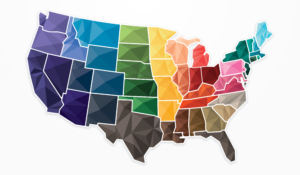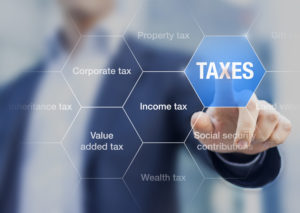A Review of Marketplace Facilitation

With the rapid growth of online sales and companies like Amazon and Ebay, marketplace facilitation has become increasingly popular, but is also very complicated. As explained by avalara, states continue to be very aggressive in finding new ways to bring revenue into their state. Many have enacted marketplace facilitator laws, which are laws that regulate marketplace facilitation and vary by state and municipality. As with all things multistate, uniformity is not always the case and different pieces of legislation can get very confusing.
In this post, we review what the idea of marketplace
facilitation is, what the marketplace facilitator laws are and how marketplace
facilitator laws are impacting retailers.
Nexus: What Do You Need To Know And How Does It Relate To State Tax?

In the state tax world, one of the most important concepts is “nexus.” Also known as “taxable presence, “nexus” is the term that describes the minimum connection a company needs to have with a state in order to be subject to the state’s taxing scheme. This includes sales tax, income tax, gross receipts tax and more.
There’s a lot that goes into the discussion around nexus, and with the recent state tax law changes, there are frequent updates. This post is a helpful start to understanding what nexus is and how it affects your business.
How Does Physical Presence Nexus Establish State Tax Exposure?
One primary way companies establish nexus is through having a physical presence in that state. For example, if a business has “boots on the ground” in terms of employees or third-party contractors working in the state, or has inventory, other personal property or real property in the state, the company likely has nexus and needs to collect and remit state tax.
Focus on Alaska

On March 30, 1867, the United States purchased Alaska from
the Russian Empire for $7.2 million, or approximately two cents per acre. The
area went through several administrative changes before becoming recognized as
a territory on May 11, 1912. It was admitted to the union as the 49th
state on January 3,1959.
It is the largest U.S. state by area and the 3rd
least populous state in the U.S. It is the northernmost and westernmost state
and has the most easterly longitude in the U.S. because the Aleutian Islands
extend into the Eastern Hemisphere. With its myriad islands, Alaska has nearly
34,000 miles of tidal shoreline.
Economic Nexus In The Wake Of The Wayfair Decision

In the United States, the sales tax landscape has drastically changed following the June 2018 U.S. Supreme Court ruling in South Dakota v. Wayfair, Inc. In this landmark decision, the high court ruled that it was constitutional for South Dakota to enact an economic nexus law. While this may seem like old news, we are still receiving queries every single day about economic nexus and how it impacts our clients.
As a result of the Supreme Court’s decision, over the last year, most of the states which impose a state-level sales tax have jumped on the economic nexus bandwagon and have enacted “Wayfair” types of laws. States are eager to collect sales tax (as well as other types of taxes) and, in theory, want to make it easier for companies to pay their taxes. In addition to physical presence, if companies create economic nexus in a state, that requires them to collect and remit sales tax and also file sales tax returns, provided the state has enacted an economic nexus statute, which again, most of them have at this point!
Economic Nexus vs. Cookie Nexus: What Do You Need To Know?

Although the precedent for economic nexus was set in June 2018, states were attempting to come up with ways to collect and remit sales tax from online transactions long before the Wayfair case made it to the courts.
Massachusetts and Ohio, for example, decided to define the computer code from internet cookies as a tangible item that could establish a physical presence nexus. However, once Wayfair passed, was this “cookie nexus” still in effect? The answer is, “Yes.” However, as always, regulations are still more complicated and confusing.
Focus on Massachusetts
Massachusetts is named after the Massachusett tribe, which once inhabited the eastern part of the state, and is one of the original 13 colonies. It is the 7th smallest state in the United States. Despite its small size, Massachusetts features numerous topographically distinctive regions. The large coastal plain of the Atlantic Ocean in the eastern section of the state contains Greater Boston, along with most of the state’s population, as well as the distinctive Cape Cod peninsula. To the west lies the hilly, rural region of Central Massachusetts, and beyond that, the Connecticut River Valley. Along the western border of Massachusetts lies the highest elevated part of the state, the Berkshires.
The entire Commonwealth of Massachusetts has played a powerful commercial and cultural role in the history of the United States. Before the American Civil War, Massachusetts was a center for the abolitionist, temperance, and transcendentalist movements. Massachusetts is home to numerous museums and historical sites. Historically themes museums and sites such as the Springfield armory National Historic Site in Springfield, Boston’s Freedom Trail and nearby Minute Man National Historical Park, both which preserve a number of sites important during the American Revolution, the Lowell National Historical Park, which focuses on some of the earliest mills and canals of the industrial revolution in the U.S., the Black Heritage Trail in Boston, which includes important African-American and abolitionist sites in Boston, and the New Bedford Whaling National Historical Park, all showcase various periods of Massachusetts’ history.
Business Climate
Originally dependent on agriculture, fishing and trade, Massachusetts was transformed into a manufacturing center during the Industrial Revolution. During the 20th century, the Massachusetts economy shifted from manufacturing to services. Modern Massachusetts is a global leader in biotechnology, engineering, higher education, finance, and maritime trade.
Presently, sectors vital to the Massachusetts economy include higher education, biotechnology, information technology, finance, health care, tourism, manufacturing, and defense. The Route 128 corridor and Greater Boston continue to be a major center for venture capital investment, and high technology remains an important sector. In recent years, tourism has played an important role in the state’s economy, with Boston and Cape Cod being the leading destinations. Other popular destinations include Salem, Plymouth, and the Berkshires.
Agriculture is also important in the state. Particular agricultural products of note include green house products making up more than one third of the state’s agricultural output, cranberries, sweet corn and apples are also large sectors of production. The state is the second-largest cranberry producing state in the union after Wisconsin.
Tax Climate
Massachusetts has a flat individual income tax rate of 5.1%- all earnings are taxed at the same rate, regardless of total income level. This flat rate applies to both single and joint filers. The top corporate income tax rate is also a flat 8%.
Massachusetts uses the sales factor for the apportionment of corporate income. Massachusetts uses the market-based method for the sourcing of services and intangible property.
Sales Tax Structure
The state sales tax has a base rate of 6.25%, on retail sales of tangible personal property, except for groceries, clothing (up to $175) and periodicals.
Massachusetts has enacted economic nexus legislation. Remote sellers are required to register, collect and remit MA sales tax if the company’s gross receipts is more than $100,000 in the previous or current calendar year. The state does not have a transaction threshold. This legislation was amended on October 1, 2019. Previously MA had a cookie nexus law which is now being replaced.
Massachusetts is fairly aggressive in its approach to the taxation of technology products for sales tax purposes. Prewritten computer software that is electronically downloaded is taxable, while custom computer software that is electronically downloaded is exempt from taxation. Lastly, Software as a Service (SaaS) is taxable. All digital content is exempt from taxation. How products are produced, sold and delivered is critical to determining their tax status.
Some states have annual sales tax holidays, during which certain items the state wants to promote the purchase of (like school supplies, emergency preparedness supplies, or energy efficient appliances) can be purchased sales tax free. However, Massachusetts does not have any scheduled sales tax holidays.
Random Facts
- Boston built the first subway in the United States in 1897.
- The Fig Newton was named after Newton, Massachusetts.
- The American Industrial Revolution began in Lowell. Lowell was America’s first planned industrial city.
- The first Thanksgiving Day was celebrated in Plymouth in 1621.
- Acushnet is the hometown of the Titleist golf ball company.
- Harvard was the first college established in North America and was founded in 1636. Because of Harvard’s size there is no universal mailing address that will work for every office at the University.
- Glaciers formed the islands of Nantucket and Martha’s Vineyard during the ice age.
- The Basketball Hall of Fame is located in Springfield.
- Norfolk County is the birthplace of four U.S. presidents: John Adams, John Quincy Adams, John Fitzgerald Kennedy and George Herbert Walker Bush.
Our team at Miles Consulting Group is available to discuss the specifics of your state tax situation, whether in Massachusetts or other states, we can help you navigate the complex tax structures arising from your multistate operations. Call us to help you achieve the best tax efficiencies.
Happy Halloween! State Tax & Its Effect On Popular Treats

Halloween is right around the corner. As you prepare to greet trick-or-treaters or dress in costumes for a party with friends, I thought it would be fun to look at how states are benefitting from the holidays, specifically through sales tax.
Obviously, certain Halloween items fall under standard taxes (e.g. Halloween costumes). But what about those treats? From candy for the kids to soda and adult beverages for the grown-ups, keep reading to learn how these sweets and drinks fall under state tax provisions.
Trick Or Treat! Candy Meets Sales Tax Laws
It’s estimated Americans will spend $2.6 billion dollars on Halloween candy this year. Although candy itself is small and fairly inexpensive, when you add up how many consumers are buying it, you can see why it becomes a state tax issue.
To determine if sales tax should be applied, the question is, “Is candy food or not?” The answer determines if candy is taxed the same way food is within the state.
Update on Economic Nexus Around the Country

Economic nexus continues to be a hot topic in the sales tax
world. Since the U.S. Supreme Court Case of South Dakota v. Wayfair
(June 2018), almost all states have enacted economic nexus laws as they want
their share of revenue from businesses selling to customers in their state. In
this week’s blog, we’ll take a look at Kansas and their struggle to get an economic
nexus law on their books as well as an update on other states that have
economic nexus laws.
Reminder- What is Economic Nexus?
In the past, companies needed to have physical presence, or
“boots on the ground,” in a state in order to have nexus (or taxable presence)
in a state. This meant that a company needed to have offices, inventory, employees,
or contractors in a state for a certain amount of time. Companies now don’t
necessarily need to have physical presence in a state in order to create nexus;
they now can have nexus in a state by virtue of economic nexus. Economic nexus
means that companies need to have sales of a certain dollar amount or needs to
have a certain number of transactions within a state. Some states require both
criteria.
How Does Economic Nexus Apply To More Than Just Sales Tax?

Last year’s Wayfair v. South Dakota decision changed the way states define nexus for sales tax purposes. In the past, a business needed to establish physical presence, but the Supreme Court’s decision set precedent for states to establish economic nexus parameters, thereby mandating a certain percentage of sales made within the state are subject to sales tax.
However, it’s important to note that economic nexus doesn’t only affect sales tax. If your company conducts a certain amount of business within the state, it may also be responsible for collecting and remitting all applicable taxes, not just sales tax.
AccountingWeb does a terrific job explaining the following ways states and cities are applying economic nexus to their jurisdiction. Note that some are not necessarily new, but more states ARE considering economic nexus in areas beyond sales tax. Here’s a quick summary to get you started.
Focus on Utah

Utah is a state in the western United States. It became the
45th state admitted to the union on January 4, 1896. It is the 13th
largest state by area, the 30th most populous and the 11th
most densely populated state.
Utah is known for its natural diversity and is home to
features ranging from arid deserts with sand dunes to thriving pine forests in
the mountain valleys. It is a rugged and geographically diverse state that is
at the convergence of three distinct geological regions: the Rocky Mountains,
the Great Basin, and the Colorado Plateau.




















